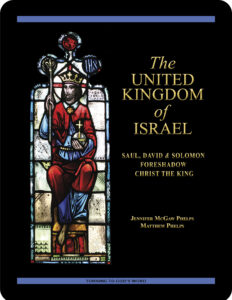 The United Kingdom of Israel:
The United Kingdom of Israel:
Saul, David & Solomon
Foreshadow Christ the King
Lesson 22 David Sins by Numbering the People
the Second Book of Samuel 23:8—24:25
Revised Standard Version Catholic Edition (RSVCE)*
New American Bible Revised Edition (NABRE)*
Catechism of the Catholic Church
ex libris (in our library)
glossary for The United Kingdom of Israel
cross references in The United Kingdom of Israel
next lesson: Solomon’s Struggle for Succession
This material coordinates with Lesson 22 on pages 131–135 in The United Kingdom of Israel: Saul, David & Solomon Foreshadow Christ the King.
“When your days are fulfilled and you lie down with your fathers, I will raise up your offspring after you, who shall come forth from your body, and I will establish his kingdom. He shall build a house for my name, and I will establish the throne of his kingdom for ever.”
—the Second Book of Samuel 7:12–13
welcome to our in-depth study of Saul, David & Solomon
We invite interested groups and individuals to check out the sample first lesson from this 28- lesson
lesson  Turning to God’s Word Catholic Bible study. These online study pages link to our free lesson videos, as well as to a glossary and cross references in the biblical text. Other study aids include maps, additional commentary, and prayers based on the primary Scripture in each lesson. The United Kingdom of Israel: Saul, David & Solomon Foreshadow Christ the King has been granted an imprimatur and may be purchased from our website shop. If you have a Bible-study question or comment, click on the “ask us your question” or “what do you think” button on any study page.
Turning to God’s Word Catholic Bible study. These online study pages link to our free lesson videos, as well as to a glossary and cross references in the biblical text. Other study aids include maps, additional commentary, and prayers based on the primary Scripture in each lesson. The United Kingdom of Israel: Saul, David & Solomon Foreshadow Christ the King has been granted an imprimatur and may be purchased from our website shop. If you have a Bible-study question or comment, click on the “ask us your question” or “what do you think” button on any study page.
open with prayer
It’s always wise to begin any Bible study with prayer, whether reading the Scriptures alone or meeting with others in a discussion study group. You can pray using your own words or use one of the opening prayers on our website. We especially like the following:
Lord Jesus, you promised to send your Holy Spirit
to teach us all things.
As we read and study your word today,
allow it to touch our hearts and change our lives. Amen.
let’s review—the Second Book of Samuel 22:1—23:7
Lesson 21 The Sweet Psalmist of Israel focuses on the tradition of David as author of many of the  Psalms. The twenty-second chapter in the Second Book of Samuel repeats Psalm 18, which praises the LORD as the Psalmist’s refuge and source of salvation. (Prayed as part of Thursday Vigils (Week I), Psalm 18 will be included in Lesson 9 From the Grave, Who Can Give You Praise? in the Turning to God’s Word Catholic Bible study Sing a New Psalm: Communicating with God Through the Prayers of the Church—Volume II: Vigils, Day Prayer & Compline, which is scheduled for publication in 2025.) The first seven verses of the twenty-third chapter in the Second Book of Samuel, however, record David’s last words,
Psalms. The twenty-second chapter in the Second Book of Samuel repeats Psalm 18, which praises the LORD as the Psalmist’s refuge and source of salvation. (Prayed as part of Thursday Vigils (Week I), Psalm 18 will be included in Lesson 9 From the Grave, Who Can Give You Praise? in the Turning to God’s Word Catholic Bible study Sing a New Psalm: Communicating with God Through the Prayers of the Church—Volume II: Vigils, Day Prayer & Compline, which is scheduled for publication in 2025.) The first seven verses of the twenty-third chapter in the Second Book of Samuel, however, record David’s last words,  emphasizing a characteristic of David that’s seldom written or talked about. In describing David’s last words as an oracle, the author of the Second Book of Samuel is calling attention to David’s prophetic abilities. David’s final instructions are to the king who will rule the eternal kingdom that the LORD has promised to give to one of David’s descendants. David can be understood to fulfill the office of prophet in the sense that he serves this future king as a counselor from God, and many of David’s prophetic Psalms point toward the Messiah or Anointed One to come.
emphasizing a characteristic of David that’s seldom written or talked about. In describing David’s last words as an oracle, the author of the Second Book of Samuel is calling attention to David’s prophetic abilities. David’s final instructions are to the king who will rule the eternal kingdom that the LORD has promised to give to one of David’s descendants. David can be understood to fulfill the office of prophet in the sense that he serves this future king as a counselor from God, and many of David’s prophetic Psalms point toward the Messiah or Anointed One to come.
map notes—the extent of David’s kingdom
The twenty-third chapter in the Second Book of Samuel lists the most important among the mighty men 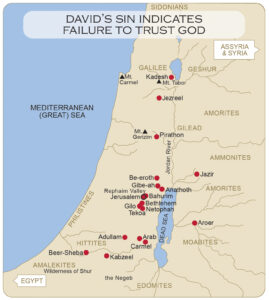 who fight in David’s forces. This chapter functions the same way as a war memorial. It can be viewed as a list of hall-of-famers who’ve earned lifetime-achievement medals. The men who have served David in bravery over the course of his life are commended for their valor. The Second Book of Samuel 23:10 and 23:12, however, call attention to the fact that it was the LORD who wrought great victories through the efforts of David’s mighty men. A look at the map for this lesson shows that many but not all of these strong fighters originally come from territory allotted to the tribe of Judah. It’s of interest that David’s military commander Joab isn’t included, although both of Joab’s brothers—Asahel and Abishai—are listed, as well as Joab’s armor-bearer. What might explain the reason that Joab’s name is absent? Click on the map (right) to enlarge it. The original map is on page 134 in The United Kingdom of Israel: Saul, David & Solomon Foreshadow Christ the King.
who fight in David’s forces. This chapter functions the same way as a war memorial. It can be viewed as a list of hall-of-famers who’ve earned lifetime-achievement medals. The men who have served David in bravery over the course of his life are commended for their valor. The Second Book of Samuel 23:10 and 23:12, however, call attention to the fact that it was the LORD who wrought great victories through the efforts of David’s mighty men. A look at the map for this lesson shows that many but not all of these strong fighters originally come from territory allotted to the tribe of Judah. It’s of interest that David’s military commander Joab isn’t included, although both of Joab’s brothers—Asahel and Abishai—are listed, as well as Joab’s armor-bearer. What might explain the reason that Joab’s name is absent? Click on the map (right) to enlarge it. The original map is on page 134 in The United Kingdom of Israel: Saul, David & Solomon Foreshadow Christ the King.
 epic literature in the Bible (21:52)
epic literature in the Bible (21:52)
In the video overview for Lesson 22, “David Sins by Numbering the People,”  Turning to God’s Word author Matthew Phelps points out that although the biblical list of great warriors who served David appears to come somewhat out of blue, it’s in the tradition of epic literature of the cultures of the time. Ancient people developed many stories around the brave deeds of their most successful warriors. Three of David’s mighty men are identified as being especially brave. (Do you remember who they are?) Matthew points
Turning to God’s Word author Matthew Phelps points out that although the biblical list of great warriors who served David appears to come somewhat out of blue, it’s in the tradition of epic literature of the cultures of the time. Ancient people developed many stories around the brave deeds of their most successful warriors. Three of David’s mighty men are identified as being especially brave. (Do you remember who they are?) Matthew points  out that while these three are lauded for being the best warriors, the fact that they’re also totally loyal to David is of equal importance.
out that while these three are lauded for being the best warriors, the fact that they’re also totally loyal to David is of equal importance.
The Scripture ranges for the videos that accompany this Catholic Bible study match the Scripture ranges for the sets of questions in The United Kingdom of Israel: Saul, David & Solomon Foreshadow Christ the King. You can follow along as Turning to God’s Word author Matthew Phelps discusses Lesson 22, “David Sins by Numbering the People,” on pages 131–135 in the study book.
WHAT DO YOU THINK about David taking a census?
A census generally is ordered for the purpose of taxation or military conscription. The twenty-fourth chapter in the Second Book of Samuel fails to give David’s precise reason for wanting a census at this late stage in his reign, but the biblical text may provide clues about David’s motivation.
 ? The account of the census appears immediately after a listing of the most important of the mighty men in David’s volunteer army. Since this army has been extremely successful, what might explain why David now is interested in increasing his military?
? The account of the census appears immediately after a listing of the most important of the mighty men in David’s volunteer army. Since this army has been extremely successful, what might explain why David now is interested in increasing his military?
? What are the pros and cons of increasing the size of the military?
? Consider whether you think that increasing the military is a good idea.
? Why do you think it is that Joab attempts to dissuade David from conducting a census?
? Do you think it likely that David has ordered the census because he wants to tax his people? Cite evidence from Scripture to support your viewpoint.
? Do you think that David is more or less efficient at conducting a census than the Romans who numbered the people in Judea at the time of Jesus birth? If necessary, refer to the second chapter in the Gospel According to Luke.
? According to the Second Book of Samuel 24:9, what specific two groups of the population have been numbered?
? Compare the numbers of people listed in David’s census with the numbers of people Saul coerced into fighting to rescue the people of Jabesh Gilead. If necessary, refer to the First Book of Samuel 11:8. What conclusion might be drawn from such a comparison?
? Why do you think it is that David so readily admits to having sinned when the prophet Gad accuses him of wrongdoing?
? What point do you think that the author of the Second Book of Samuel 24:1 is trying to make concerning David’s motivation for numbering the people?
? What message can Christians take away from this account?
 sin—you could look it up in our archives
sin—you could look it up in our archives
In the Second Book of Samuel 24:10, David’s heart strikes him and he confesses to the LORD: “I have sinned greatly in what I have done.” To learn about the meaning of the word “sin,” read Lost in Translation, an online column in which Turning to God’s Word author Matthew Phelps helps readers connect with ideas expressed in the original languages of the Scriptures. New Lost in Translation entries are posted on Mondays, and past entries are archived on our website. Contact us if you’d like to receive Lost in Translation by email every week.
pray with the Psalms—David’s likeness to God
After David realizes that he’s sinned by ordering a census, the LORD, through the prophet Gad, offers David a choice of three punishments. David chooses pestilence to fall upon the land  of Israel. The Second Book of Samuel 24:17 records David’s reaction when he sees the LORD’s angel striking down the people: “Behold, I have sinned, and I have done wickedly; but these sheep, what have they done? Let your hand, I pray you, be against me and against my father’s house.” In comparing the people to sheep, David is displaying an understanding of his own protective role as shepherd. In Psalm 23, the LORD himself is described as a shepherd, reinforcing that David’s heart is similar to the LORD’s heart. Psalm 23 also foreshadows Jesus’ description of himself as the good shepherd, found in the tenth chapter in the Gospel According to John.
of Israel. The Second Book of Samuel 24:17 records David’s reaction when he sees the LORD’s angel striking down the people: “Behold, I have sinned, and I have done wickedly; but these sheep, what have they done? Let your hand, I pray you, be against me and against my father’s house.” In comparing the people to sheep, David is displaying an understanding of his own protective role as shepherd. In Psalm 23, the LORD himself is described as a shepherd, reinforcing that David’s heart is similar to the LORD’s heart. Psalm 23 also foreshadows Jesus’ description of himself as the good shepherd, found in the tenth chapter in the Gospel According to John.  Prayed at Sunday Vigils (Week I), Psalm 23 will be included as part of Lesson 1 He Who Sits in the Heavens Laughs in the Turning to God’s Word Catholic Bible study Sing a New Psalm: Communicating with God Through the Prayers of the Church—Volume II: Vigils, Day Prayer & Compline, which is scheduled for
Prayed at Sunday Vigils (Week I), Psalm 23 will be included as part of Lesson 1 He Who Sits in the Heavens Laughs in the Turning to God’s Word Catholic Bible study Sing a New Psalm: Communicating with God Through the Prayers of the Church—Volume II: Vigils, Day Prayer & Compline, which is scheduled for  publication in 2024. (Learn more about Jesus as the Good Shepherd in Lesson 13 I Am the Good Shepherd in the Turning to God’s Word Catholic Bible study The Gospel According to John: An Encounter with Grace & Truth.)
publication in 2024. (Learn more about Jesus as the Good Shepherd in Lesson 13 I Am the Good Shepherd in the Turning to God’s Word Catholic Bible study The Gospel According to John: An Encounter with Grace & Truth.)
sincere & insincere responses to difficulty
St. John Henry Newman (1801–1890) was an Anglican who became a Catholic cardinal. He taught that David, when told of his sin by the prophet Gad, can be seen as a model for Christians facing difficulty:
“Holy David, after he had sinned in numbering the people and was told to choose between three punishments offered him, showed the same honest and simple-hearted devotion in choosing that of the three which might be the most exactly called falling into the LORD’s hands. If he must suffer, let the LORD chastise him—’I am in a great strait,’ he says; ‘let us fall now into the hands of the LORD, for his mercies are great; and let me not fall into the hands of men.’ Great, then is the difference between sincere and insincere Christians, however like their words may be to each other. Everyone, even after the gift of God’s grace, sins: God’s true servants profess and sin—sin and are sorry; and hypocrites profess and sin—sin and are sorry. Thus the two parties look like each other. But the word of God discriminates one from the other by this test—that Christ dwells in the conscience of one, not of the other; that the one opens his heart to God, the other does not; the one views almighty God as LORD and owner of all that he is, the other as an accidental guest; the one gives himself over to God, and considers himself God’s servant and instrument now and forever, the other admits him as if only for a short time.”
discernment is making wise choices
David chooses a consequence that kills 70,000 of God’s people. What other choices was David given? What are the advantages to David’s choice? What are the disadvantages? How long does the pestilence persist before God relents? What causes the LORD to stop the destruction? Consider whether there might be a connection between the location where the destroying angel is wreaking havoc and David’s request to the LORD to halt the pestilence.
ex libris—two books about spiritual direction
Two of the best books we’ve recently come across that discuss the practical ins and outs of 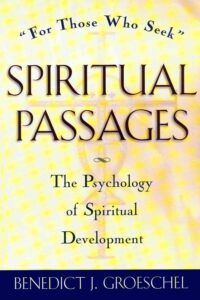
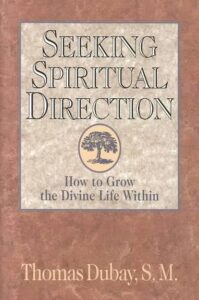 discernment are Spiritual Passages by Benedict Groeschel, C.F.R., and Seeking Spiritual Direction by Thomas Dubay, S.M.
discernment are Spiritual Passages by Benedict Groeschel, C.F.R., and Seeking Spiritual Direction by Thomas Dubay, S.M.  Both authors have written other excellent books as well, but people interested in learning more about spiritual direction may find these two titles particularly insightful. At ex libris—main bookshelf, you can read excerpts from both of these books by Catholic priests, and you also can learn more about other works related to Catholic Bible study.
Both authors have written other excellent books as well, but people interested in learning more about spiritual direction may find these two titles particularly insightful. At ex libris—main bookshelf, you can read excerpts from both of these books by Catholic priests, and you also can learn more about other works related to Catholic Bible study.
WHAT DO YOU THINK might be unusual about David’s request for God to stop the pestilence?
 ? What deal does David offer to make with the LORD in order to bring about an end to the people being killed by pestilence?
? What deal does David offer to make with the LORD in order to bring about an end to the people being killed by pestilence?
? Is this a trade that you’d expect David to want to make?
? What might motivate the LORD to heed David’s request?
? Do you see anything unusual about the timing of Gad’s counsel to David to build an altar to the LORD?
? Consider why Araunah the Jebusite—a man who isn’t a descendant of Jacob—is willing to cooperate with David’s plan to build at altar on his property.
what’s the most important thing about the altar that David builds?
Read “Establishing a Holy Site” on page 135 of The United Kingdom of Israel: Saul, David & Solomon Foreshadow Christ the King to learn how the altar built by David on the threshing floor that belonged to Araunah the Jebusite points the way toward Jesus as the Messiah.
Q&A—reading difficult passages in Scripture
A participant in one of our Bible studies is concerned about an article that appeared in her local Catholic newspaper. Although this original question came in the context of our Catholic Bible study of the book of Genesis, we’re repeating it here because the specific texts mentioned in the article included the twenty-fourth chapter in the Second Book of Samuel. The author of that article argues that Old  Testament texts showing God to be arbitrary, heartless, and violent aren’t to be taken literally. The Turning to God’s Word Catholic Bible study In the Beginning: The Book of Genesis provides an in-depth look at the first book in the Old Testament.
Testament texts showing God to be arbitrary, heartless, and violent aren’t to be taken literally. The Turning to God’s Word Catholic Bible study In the Beginning: The Book of Genesis provides an in-depth look at the first book in the Old Testament.
 Q: Concerning difficult passages of Scripture, an article in my local Catholic newspaper argues that: “Whenever they are read, they could be preceded by the kind of disclaimer we now often see at movies where we are told: No real animals died while making this film. So too, no real people die in these texts.” I can understand that some biblical texts may be exaggerated to make a point, but I have a hard time believing that no one was harmed.
Q: Concerning difficult passages of Scripture, an article in my local Catholic newspaper argues that: “Whenever they are read, they could be preceded by the kind of disclaimer we now often see at movies where we are told: No real animals died while making this film. So too, no real people die in these texts.” I can understand that some biblical texts may be exaggerated to make a point, but I have a hard time believing that no one was harmed.
what Matthew says: The following response was written by Turning to God’s Word author Matthew Phelps. Also of interest is an archived Lost in Translation discussion he wrote some time ago about the difference between exegesis and eisegesis, two methods of approaching Bible study.
At the heart of this question are a few basic struggles that we all have to  work through as we learn to read and study the Scriptures for ourselves. First, is everything we read in Scripture literal? This article lands on what I think is the only defensible position—that no, ultimately not every word of Scripture is factual in the same way that we might expect a newspaper or magazine article to be factual. The Bible is the living Word of God, which makes it unlike any other book or writing. This can be a hard thing for some people to wrap their minds around, especially when they’ve been catechized to accept the opposite. (To learn more, you can watch The Bible as the Living Word of God, a video from summer 2015 shot during our first Turning to God’s Word Bible study retreat at Conception Abbey. A link can be found on our video page.)
work through as we learn to read and study the Scriptures for ourselves. First, is everything we read in Scripture literal? This article lands on what I think is the only defensible position—that no, ultimately not every word of Scripture is factual in the same way that we might expect a newspaper or magazine article to be factual. The Bible is the living Word of God, which makes it unlike any other book or writing. This can be a hard thing for some people to wrap their minds around, especially when they’ve been catechized to accept the opposite. (To learn more, you can watch The Bible as the Living Word of God, a video from summer 2015 shot during our first Turning to God’s Word Bible study retreat at Conception Abbey. A link can be found on our video page.)
Once we accept that not every word is literal, we’re left with the problem of trying to figure out what to make of the more difficult passages. Basically the whole of scholarship on the Scriptures concerns itself with a number of questions relevant to this point, such as—When was a book written? By whom? For whom? What type of literature was it intended to be?
When addressing these questions, the text must be primary. The author of the article certainly overstates when he asserts that God killed no one in the Old Testament. That position contradicts way too much of Scripture to be plausible. God created a world in which he allowed death to exist and to come to all people. What’s the death of 70,000 in that context? What’s the difference for God whether someone dies at age 30 or at age 80?
The other key question or understanding we all have to come to terms with in reading the Scriptures is that our faith as we know it has evolved. There are terrible things that happened in our past that paved the way for the coming of Christ—and God was involved through them all. Taken as a whole, the Scriptures show an evolution, and the things that happen always ultimately serve a purpose. True understanding of the Scriptures involves understanding this development and learning to see the same God in the Old Testament that we see revealed by Jesus Christ.
The mistake made in the article is an easy one to make. When we read something in the Bible that’s incompatible with our understanding of God, one or the other has to change. The diocesan author chose, by convoluted means, to change the text. Many others throughout history have done the same. Martin Luther went so far as to try to remove biblical passages—and even the entire book of Revelation—because he felt these weren’t consistent with his view of God. The greater and more rewarding challenge instead is to be able to adapt our view of God to accommodate and to exist harmoniously with the Scriptures. This changing and expanding of our understanding of God is, I think, the primary purpose of Bible study and should be our goal whenever we read Scripture.
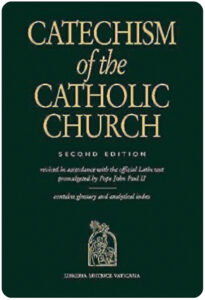 the best Catholic commentary about Scripture
the best Catholic commentary about Scripture
To find out more about how Church teaching is supported by Scripture passages in The United Kingdom of Israel: Saul, David & Solomon Foreshadow Christ the King, check out the Index of Citations in the Catechism of the Catholic Church. Links (Revised Standard Version Catholic Edition [RSVCE*]) to the primary Scripture passages in the lesson and relevant paragraphs in the Catechism are provided here. Not every passage in the biblical text for this Catholic study is referenced in a Catechism paragraph, however, including the passage in this lesson from the Second Book of Samuel 23:8—24:25.
ways our glossary might prove helpful
In addition to providing extra information about geographical locations, our glossary also points out  persons and places mentioned in the biblical text under multiple names or spellings. If you can remember a name but aren’t sure in which lesson it shows up, you can find it in the glossary, which lists every proper noun that appears in the primary biblical text for The United Kingdom of Israel: Saul, David & Solomon Foreshadow Christ the King.
persons and places mentioned in the biblical text under multiple names or spellings. If you can remember a name but aren’t sure in which lesson it shows up, you can find it in the glossary, which lists every proper noun that appears in the primary biblical text for The United Kingdom of Israel: Saul, David & Solomon Foreshadow Christ the King.
to learn more, read more Scripture
If you’re having difficulty with a particular passage of Scripture, it can be helpful to read the relevant  cross references—but looking these up can take time. To make that easier, we’ve compiled the cross references from the Revised Standard Version Second Catholic Edition (RSV2CE)—the translation that we reprint in our study books. That list can be found at the top of every online study page, and it includes links to cross references in the primary biblical text for The United Kingdom of Israel: Saul, David & Solomon Foreshadow Christ the King.
cross references—but looking these up can take time. To make that easier, we’ve compiled the cross references from the Revised Standard Version Second Catholic Edition (RSV2CE)—the translation that we reprint in our study books. That list can be found at the top of every online study page, and it includes links to cross references in the primary biblical text for The United Kingdom of Israel: Saul, David & Solomon Foreshadow Christ the King.
don’t forget about our indexes & extra online material

 If you’re trying to locate information about a specific Scripture passage, you can look it up in the index at the back of the study book or sample lesson. If you want to find a particular commentary, you can look up its title in the topics index. To learn more about another book of the Bible for which there’s a Turning to God’s Word study, visit the online study directories to read the commentaries and watch any accompanying videos. Finally, if you have a question or would like to make a comment about any of our studies, you can use one of the “ask us your question” or “what do you think” buttons to email our authors.
If you’re trying to locate information about a specific Scripture passage, you can look it up in the index at the back of the study book or sample lesson. If you want to find a particular commentary, you can look up its title in the topics index. To learn more about another book of the Bible for which there’s a Turning to God’s Word study, visit the online study directories to read the commentaries and watch any accompanying videos. Finally, if you have a question or would like to make a comment about any of our studies, you can use one of the “ask us your question” or “what do you think” buttons to email our authors.
ex libris—Church documents & books about religious topics
Link to magisterial documents referred to in our Bible studies at ex libris—magisterial documents.  This listing includes significant recent encyclicals as well as a number of historical Church documents. Recommended books related to Scripture study can be found at ex libris—main bookshelf.
This listing includes significant recent encyclicals as well as a number of historical Church documents. Recommended books related to Scripture study can be found at ex libris—main bookshelf.
wondering how to pronounce some of these words?
The following link is to a reading from the New International Version (NIV) Bible. To listen, click on the audio icon above the printed text. Although not taken from the translations used in our study materials, the NIV reading provides an audio guide to pronunciation of words in this lesson’s primary biblical text. A close online version of the translation of the Bible used in Catholic liturgy in the United States as well as an audio guide for daily Mass readings for the current month can be found on the website of the United States Conference of Catholic Bishops (USCCB).
the Second Book of Samuel 23:8—24:25 (NIV)
 close with Bible-based prayer related to this lesson
close with Bible-based prayer related to this lesson
Many of our Catholic study groups like to conclude their discussions with a prayer based on the scriptural focus of their lesson, and some participants include Scripture-specific prayer in their individual study. If you’re uncomfortable composing your own Bible-based prayers you can follow our four easy steps. If you prefer, you can use the following prayer based on the biblical text in this lesson in the study book The United Kingdom of Israel: Saul, David & Solomon Foreshadow Christ the King.
O God, you allow your people to be tempted by sin
in order that we might make the free-will choice to love you.
Help us to seek wise counsel when we’re faced with difficult situations.
Teach us to admit to our failings
and to rely on your mercy and goodness
as we deal with the consequences of our sin.
We ask this in the name of Jesus Christ,
whose every decision reflects the desire to submit to your will. Amen.
Lesson 23 Solomon’s Struggle for Succession—the First Book of the Kings 1:1—2:46
Lesson 21 The Sweet Psalmist of Israel—the Second Book of Samuel 22:1—23:7
you also may like our study of the Gospel According to John
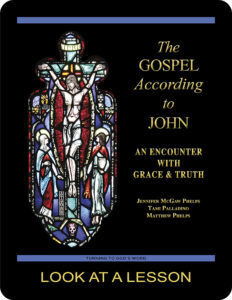 The Gospel According to John: An Encounter with Grace & Truth, a 25-lesson Catholic Bible study with an imprimatur, examines the Fourth Gospel’s view of Jesus Christ as the Son of God, with special emphasis on the institution of the sacraments of the Church as the means by which Christians are purified and made holy. This recently revised study includes maps and additional commentary, and takes a closer look at the way in which Jesus relates to individual men and women. Click on the book’s cover to view a sample lesson.
The Gospel According to John: An Encounter with Grace & Truth, a 25-lesson Catholic Bible study with an imprimatur, examines the Fourth Gospel’s view of Jesus Christ as the Son of God, with special emphasis on the institution of the sacraments of the Church as the means by which Christians are purified and made holy. This recently revised study includes maps and additional commentary, and takes a closer look at the way in which Jesus relates to individual men and women. Click on the book’s cover to view a sample lesson.
start a Turning to God’s Word Bible study
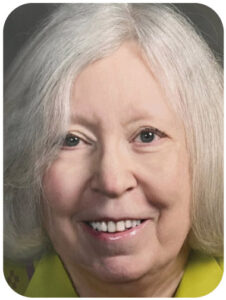 Thank you for your interest in The United Kingdom of Israel: Saul, David & Solomon Foreshadow Christ the King.
Thank you for your interest in The United Kingdom of Israel: Saul, David & Solomon Foreshadow Christ the King.  Information about beginning a Turning to God’s Word Bible study can be found at start a Bible study. Tami, Matthew, and I are available to answer questions. Contact us if you’d like to start one of our studies or have your schedule listed with other TtGW study groups on our website. —Jennifer
Information about beginning a Turning to God’s Word Bible study can be found at start a Bible study. Tami, Matthew, and I are available to answer questions. Contact us if you’d like to start one of our studies or have your schedule listed with other TtGW study groups on our website. —Jennifer
*There are seven deuterocanonical books in the Old Testament—the Books of Tobit, Judith, Wisdom, Sirach, Baruch, and First and Second Maccabees, as well as some passages in the Books of Esther and Daniel. Protestants usually refer to these works as “apocryphal,” a word that means “outside the (Protestant) canon” because they’re excluded from most Protestant Bibles. The word “deuterocanonical” means “second canon”; Catholics use that word to refer to any section of the Catholic Old Testament for which there are no extant, or existing, Hebrew manuscripts. All of the deuterocanonical books appear in the Septuagint, the earliest remaining versions of which date to the 1st century B.C. This Greek translation of the Old Testament was in common use by Jews at the time of Jesus—but the same books aren’t found in existing Hebrew manuscripts, which aren’t as old as the oldest version of the Septuagint. Learn more by reading How Do Catholic & Protestant Bibles Differ?
Turning to God’s Word printed Bible studies use the 2006 Revised Standard Version Second Catholic Edition (RSV2CE) translation for all Scripture references except those to the Psalms, which are taken from The Abbey Psalms and Canticles, prepared by the Benedictine monks of Conception Abbey and published in 2020 by the United States Conference of Catholic Bishops (USCCB). All Scripture links for the online study pages for The United Kingdom of Israel: Saul, David & Solomon Foreshadow Christ the King are to the 1966 Revised Standard Version Catholic Edition (RSVCE) translation. The New International Version (NIV) audio recordings follow the same chapter and verse numbering as the RSV Catholic translations, but the NIV translation doesn’t include the deuterocanonical books and passages.
The 1966 RSVCE uses archaic pronouns and verb forms such as “thee,” “thou,” “didst” in the Psalms and in direct quotations attributed to God. The 2006 RSV2CE replaces those with more accessible English. The few significant translation changes in the RSV2CE include rendering almah as “virgin” in the Book of Isaiah 7:14 and restoring the term “begotten” in the Gospel According to John 3:16.
Numbering varies for some passages in this Bible study. Turning to God’s Word studies (print and digital) follow the numbering in the Revised Standard Version Catholic translations (RSV2CE and RSVCE). Discrepancies in the New American Bible Revised Edition (NABRE) are noted in the Index of Scripture Citations in the study book and the online sample.
 You can learn more about the Psalms by viewing a sample lesson from the Turning to God’s Word Catholic Bible study Sing a New Psalm: Communicating with God Through the Prayers of the Church—Volume I: Lauds & Vespers. The second part of that study, Sing a New Psalm: Communicating with God Through the Prayers of the Church—Volume II: Vigils, Day Prayer & Compline, is scheduled for publication in 2025. Some verse numbers may vary in different translations of the Psalms.
You can learn more about the Psalms by viewing a sample lesson from the Turning to God’s Word Catholic Bible study Sing a New Psalm: Communicating with God Through the Prayers of the Church—Volume I: Lauds & Vespers. The second part of that study, Sing a New Psalm: Communicating with God Through the Prayers of the Church—Volume II: Vigils, Day Prayer & Compline, is scheduled for publication in 2025. Some verse numbers may vary in different translations of the Psalms.
